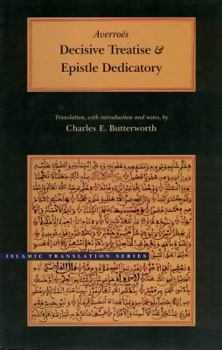Decisive Treatise and Epistle Dedicatory
Select Format
Select Condition 
Book Overview
Averroes (1126-1198) was the first and last great Aristotelian of the classical Islamic world; his commentaries influenced Christian thinkers and earned him a mention in Dante's Divina Commedia. This... This description may be from another edition of this product.
Format:Hardcover
Language:English
ISBN:0842524797
ISBN13:9780842524797
Release Date:January 2002
Publisher:Brigham Young University Press
Length:170 Pages
Weight:0.85 lbs.
Dimensions:0.7" x 6.3" x 9.3"
Customer Reviews
3 ratings
Averroës' Defense of Philosophy
Published by Thriftbooks.com User , 16 years ago
Averroës (ibn Rushd) remains one of the most important and influential figures in both Islamic and Western philosophy, though his thought was more enduring in the latter. While he marks essentially the end of the philosophical tradition in the Islamic West (philosophy continued in the Islamic East in Persia), his thought and writing on Aristotle would go one to be an important influence on Thomas Aquinas and other medieval scholastic theologians in Christian Europe, and Averroës is even paid homage by the great Italian poet Dante. For Averroës, a devout Muslim, in the wake of the attack leveled against the philosophers by al-Ghazali his goal was to show that philosophy was not the enemy or rival of religion, but rather its partner. In the Decisive Treatise Averroës seeks to demonstrate the compatibility of philosophy with the Islamic faith and even claims that the study of philosophy is commanded by the Qur'an. Dr. Charles Butterworth presents to us an excellent and scholarly translation of Averroës' writings. For anyone interested in the debates between philosophers and the traditional theologians within the Islamic intellectual tradition, as well as more information on one of the figures that shaped Western philosophy, this is an essential book to have.
On Philosophical Tools
Published by Thriftbooks.com User , 18 years ago
This is an extraordinary work. Averroes is here presenting a 'legal' case against the art of Kalam (speculative theology) with the Islamic Jurists sitting in Judgment. But, and this is important, this argument is not against religion per se. Now, the Latin West was very aware of the Aristotelian writings of Averroes but unaware of his other writings. The Christians knew his Commentaries and even of his controversy with Ghazali. But they were largely unaware of his works that attempt to 'harmonize' philosophy and revelation (i.e., religious law). The 'Decisive Treatise' is among the most important of these. Here Averroes is at pains to show that not only isn't philosophy forbidden by the Koran; it is in fact commanded - but only for some! Humanity is divided into three groups by Averroes. There are the common people (the 'people of rhetoric'), people of uncommon discernment (the 'people of dialectic'), and philosophers (the 'people of demonstration'). It is a pyramid, with the ordinary people at the base and the falasifa (i.e., Islamic philosophers) at the summit. But this is no celebration of diversity, the ideal that hovers over these pages is Ijma - consensus. Averroes is charging the 'people of dialectic' with the ruin of consensus. What ruins consensus? Interpretation. The 'people of interpretation' (both Falasifa and Theologians) must keep the vagaries of interpretation from the people. In this the Islamic Theologians have, according to our author, failed miserably. The Falasifa are let off with a slap. Now, to introduce a schema not entirely foreign to the text, one could say that in the medieval Islamic landscape there are basically three institutions: Law, Theology, Philosophy. What Averroes intends to do is forbid access to theological and philosophical speculation (i.e., interpretation) to the people. Okay, but why involve the Islamic Jurists? Because the Theologians have proven incapable of keeping their interpretational arguments from the people. This has two consequences -the ruin of consensus, and the rise of unbelief- and they are both bad. The Jurists are interjected into these interpretational arguments in order to keep these disputes from the common people. The Jurists, guided by the falasifa, are to decide what can and cannot be publicly said. One is tempted to say that this in effect leaves the falasifa as the only competent interpreter. But it seems it would be a mistake to say that Averroes intends to do away with the Islamic Theologians. There are things in the Koran about which demonstrative certainty is impossible, thus there must be discussion of the (merely) possible - this is the legitimate realm of dialectics. It is only the overriding importance of Ijma (consensus) in the Islamic context that makes the Jurists more 'important' than the Theologians. The theologians discuss possibilities that should only be heard by a few; the Law (i.e., the Koran) however, is for all. But this last objection can be aimed at th
Very Worthwhile
Published by Thriftbooks.com User , 22 years ago
Ibn Rushd or Averroes is one of the most important philosophers in the Islamic tradition, and also one of the most important of all commentators on Aristotle. And Charles Butterworth is one of the premiere translators of Averroes.This particular text is a very important defense of philosophy against those (in Averroes's specific case, Muslims) who argued that philosophical reasoning is a violation of religious law. Such issues are still alive, more or less (for example, in the struggle between science and religion), so this book has more than merely antiquarian interest.The translation is very clear, and, for those who read Arabic, it's helpful to have the original text on the facing page. Given the quality of the work, too, the book is surprisingly inexpensive.Highly recommended.





